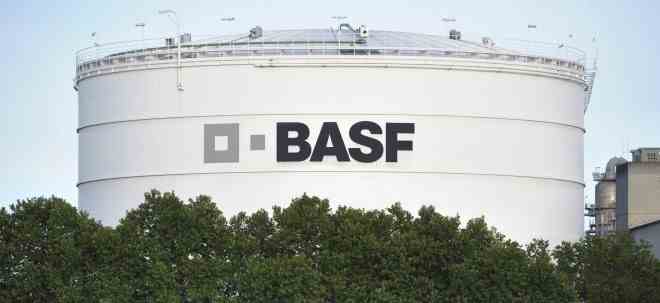According to preliminary calculations, the result after taxes and non-controlling interests of minus 1.376 billion euros is both significantly below the previous year’s value of plus 5.523 billion euros and below the average analyst estimates for 2022 (Vara: plus 4.768 billion Euro).
According to the other information, the reason for the after-tax loss is non-cash value adjustments on the investment in Wintershall Dea AG in the amount of around 7.3 billion euros, of which 5.4 billion euros in the final quarter. These primarily result from the deconsolidation of Wintershall Dea’s Russian exploration and production activities. Wintershall Dea wants to withdraw completely from Russia.
As BASF further announced, thanks to higher prices and positive currency effects, sales increased last year by an estimated 11 percent to EUR 87.327 billion and were thus within the range of EUR 86 to 89 billion forecast by the company itself. EBIT before special items was expected to be 6.878 billion euros, 890 million below the previous year’s level, but remained within the range of 6.8 to 7.2 billion euros forecast by BASF.
BASF will present the final annual figures on February 24.
Wintershall DEA withdraws from Russia
Wintershall DEA wants to withdraw completely from Russia. “Wintershall DEA will end its activities in Russia,” announced CEO Mario Mehren. “Continuing our business in Russia is unsustainable. Russia’s war of aggression is incompatible with our values. It has destroyed cooperation between Russia and Europe.”
In recent months, the Russian government has restricted the activities of Western companies in the country, Mehren said. In addition, external interventions in the activities of Wintershall DEA’s joint ventures meant that Wintershall could not operate in Russia as before. “The joint ventures were de facto economically expropriated.”
According to further information, Wintershall deconsolidated the Russian business from the financial reporting in the fourth quarter and is therefore expected to post a one-off loss of 5.3 billion euros. This relates to Wintershall’s Russian joint ventures and write-downs on the investments in Nord Stream AG and Wiga-Transport Beteiligungs-GmbH & Co. KG.
When the war in Ukraine broke out, Wintershall put its Russian business to the test and promptly halted investments in new projects in Russia and with Russian partners outside Russia. The DAX group BASF holds around 72 percent of Wintershall DEA.
This is how the BASF share reacts – analysts calm down
A surprising loss of billions unsettled BASF investors, who had been spoiled this year. The fact that the loss is unlikely to affect dividend payments was reassuring. The shares of the Ludwigshafen-based chemical company completely made up for initial losses of more than two percent on Wednesday and were recently quoted 0.55 percent higher at 53.13 euros.
The reason for the billions lost at BASF last year is the withdrawal of the subsidiary Wintershall Dea from Russia and the associated high depreciation. The subsidiary complains about the factual expropriation of its holdings there in Russia. According to the information, she is planning a complete withdrawal from the country in compliance with the legal provisions.
However, burdens as a result of the Russian war of aggression in Ukraine and the resulting sharp rise in energy prices, especially in Europe, had already become apparent. The top management around CEO Martin Brudermüller had therefore already announced an austerity program.
Day-to-day business was also rather gloomy for BASF in 2022. The preliminary business figures presented the previous evening also contained good news, wrote Jürgen Molnar, capital market strategist at the trading house Robomarkets. In this way, the chemical group was able to pass on the higher costs to customers and thus maintain profitability.
The bottom line is that stockbrokers reacted rather calmly. The high depreciation was actually an open secret, said a dealer. And the analyst David Varga from Bankhaus Metzler can even see something positive about the Wintershall write-downs in relation to Russia. Because these would restore the flexibility of the division and thus pave the way for the IPO of the division.
Since depreciation and amortization are non-cash expenses, experts see no danger for BASF’s dividend payments. Analyst Georgina Fraser from the US investment bank Goldman Sachs noted that the cash inflows are typically decisive for the distributions of the Ludwigshafener. For 2021, BASF had distributed EUR 3.40 per share. Analysts currently expect the Dax group to distribute the same amount to investors in 2022.
Analyst Chetan Udeshi from the US bank JPMorgan wrote that the chemicals group’s adjusted operating profit in the final quarter of 2022 failed to meet its and market expectations. However, the BASF shares are attractively valued and one of the most promising bets on an economic recovery supported by the reopening of China from the second quarter.
In the past year, the chemical industry had to struggle primarily with the sharp rise in gas prices. However, because this has recently fallen significantly again, BASF’s share price has also benefited. In the still young stock market year 2023 alone, the papers were currently able to increase by almost 14 percent. The Dax rose by 9 percent during this period.
Thanks to the strong start to the year, the technical picture of BASF shares is currently brighter. Above all, the papers are trading comfortably above the much-noticed 200-day moving average, which is a measure of long-term price development. But even in the short and medium term, the trends are pointing upwards.
FRANKFURT (Dow Jones) /
FRANKFURT (dpa-AFX)
Leverage must be between 2 and 20
No data
More news about BASF
Image sources: BASF SE

